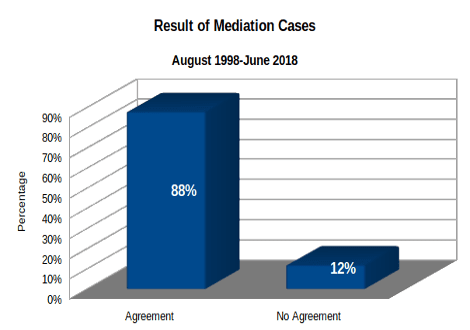
WSEMS Outcomes
Mediation
From August 17, 1998 – June 30, 2018
- 1,734 requests for mediation were received
- 1,211 cases went to mediation; 1,067 concluded with a full or partial agreement; 12 cases are still open. This time period has an 88% agreement rate.

- 88% of mediation cases which “went to session” reached agreement
- 12% of mediation cases which “went to session” did not reach an agreement
- As a result of mediation, 168 due process hearing requests were dismissed; 78 IDEA state complaints were withdrawn; 11 Office of Civil Rights complaints were withdrawn; and 3 civil lawsuits were withdrawn
In 2016, CADRE (Consortium for Appropriate Dispute Resolution in Special Education) released the average national agreement rate in special education mediation over the last nine years to be 69%. The WSEMS agreement rate for the same time is much higher at 89%.
WSEMS statistics and research are based on:
- All participants and the mediator are invited to complete surveys after the mediation session.
- A research methodologist analyzes the data.
- The data provides continuing feedback to the WSEMS as the effectiveness of the mediation process.
From 2000-2018, 2,834 Mediation surveys and 1,033 mediator surveys were returned to our office and the results indicated:
- 94% of participants believed that mediation gave them the opportunity to be part of the decision making process
- 89% were satisfied with the mediation process
- 92% said they would use mediation again
- 88% said they would use the same mediator again
- When one student’s disability was identified by the mediator, the following areas of disability were the most common:
- 32% Autism
- 23% Emotional Behavior Disability
- 15% Other Health Impaired
Agreements are in writing and may be reviewed by a lawyer prior to signing. These agreements are contracts between the parties (signers) and should be as specific as possible regarding who, what, when, where and how the terms should be performed. If any party fails to follow through with the agreement, the parties can ask the system to reopen the mediation. In addition, when the agreement is prepared, the parties may include a provision that they will return to mediation if a dispute arises or there is a need for a need for clarification in their agreement. One benefit of the mediation process is to help the parties establish better communication. Sometimes issues that arise after mediation can be settled through direct contact between the parties, either in person or by telephone.
The WSEMS, as a neutral administrator of the mediation system, is not an enforcement agency. The parties must enforce the agreement they have signed. If the WSEMS were to accept one party’s position that the agreement was not being enforced, the WSEMS would become an advocate for either parents or school districts. This could compromise the WSEMS’ position as a neutral administrator. As a result, the WSEMS’ role in the mediation concludes with an analysis of the surveys completed by the mediation participants following the session. Advocacy is the role of parents’ organizations or school district personnel, and their attorneys and advocates.
IEP Facilitation Outcomes
The WSEMS began the IEP facilitation service in 2004. The WSEMS sought input from our stakeholder group with members from the special education community on how to best implement the service.
A neutral, trained professional facilitator helps the student’s IEP team with the process of the meeting. The service may be used for any IEP team meeting, including:
- Initial or first
- Annual
- Re-evaluation
- First evaluation
- Manifestation Determination
In the screening process with our intake specialist, districts and families identify meeting process concerns that the facilitator can help with, for example: keeping the focus on the student, time management, and keeping the meeting moving forward.
All participants, including the facilitator, are asked to complete surveys after the facilitated IEP meeting. A research methods expert analyzes the survey information which provides the WSEMS continuing feedback on the question: How are we doing?
From 2004-2017, 1,557 participant surveys were returned to our office and the results indicated:
- 84% believed IEP facilitation gave them the opportunity to be part of the process
- 90% were satisfied the overall IEP facilitation process
- 81% believed the facilitation will improve future IEP meetings